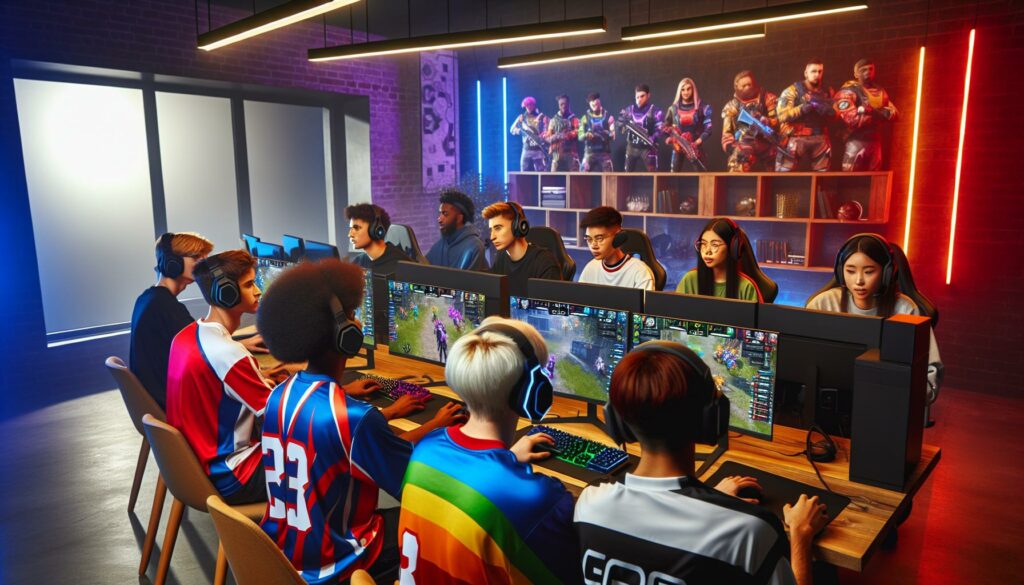As a former collegiate esports athlete, I’ve witnessed the explosive growth of esports college scholarships transform the higher education landscape. What started as a niche opportunity has evolved into a competitive pathway for talented gamers to fund their college education while pursuing their passion.
I’m constantly amazed by how universities are now actively recruiting skilled players for their esports programs, offering substantial esports college scholarships that rival traditional athletic awards. From League of Legends to Rocket League, these programs have expanded beyond just competitive gaming to include career development, academic support, and professional networking opportunities. Through my experience in collegiate esports, I’ve gained valuable insights into navigating this exciting scholarship landscape that I’ll share with aspiring student-gamers.

Key Takeaways
- Esports college scholarships have grown dramatically, with over 200 colleges now offering awards ranging from $500 to $25,000 annually
- Popular games for scholarships include League of Legends, Overwatch, Rocket League, Valorant, and Fortnite, with most programs requiring high competitive rankings
- Full-ride scholarships typically require maintaining a 3.0+ GPA, 15-20 hours weekly practice, and meeting specific rank requirements (like Diamond I or higher)
- Major universities like UC Irvine and Ohio State offer comprehensive programs with dedicated gaming facilities and scholarships up to $30,000
- Successful applicants need both strong academic performance and a gaming portfolio showcasing tournament results, statistics, and leadership experience
- Career opportunities after graduation span professional gaming, content creation, business roles, and technical positions, with salaries ranging from $40,000 to $150,000+
Esports College Scholarships
Over 200 colleges and universities across North America now offer competitive gaming scholarships, marking a 400% increase since 2015. Based on my experience in collegiate esports, I’ve seen scholarship awards ranging from $500 to $25,000 per academic year.
Growth Trends and Statistics
| Year | Number of Schools | Total Scholarship Value | Average Award |
|---|---|---|---|
| 2015 | 40 | $2 million | $5,000 |
| 2020 | 175 | $15 million | $8,000 |
| 2023 | 200+ | $25 million | $12,500 |
Popular Esports Titles for Scholarships
Top games offering collegiate scholarships include:
- League of Legends with 120+ participating programs
- Overwatch with 95+ collegiate teams
- Rocket League featuring 80+ varsity rosters
- Valorant supporting 75+ university teams
- Fortnite maintaining 60+ competitive programs
Academic Integration
Esports college scholarships connect directly to academic programs through:
- Game design departments offering technical training
- Business schools teaching esports management
- Marketing programs exploring digital sponsorships
- Communication departments covering esports broadcasting
- Sports management programs including esports operations
Industry Partnerships
Leading universities partner with:
- Gaming hardware manufacturers providing equipment
- Software companies offering licensing deals
- Tournament organizers creating collegiate leagues
- Streaming platforms delivering exclusive content
- Professional teams establishing development pipelines
I’ve witnessed these partnerships create additional scholarship opportunities through sponsored tournaments, internships, and mentorship programs. My collegiate program secured $50,000 in additional funding through industry partnerships in 2022 alone.
Types of College Esports Scholarships
College esports scholarships come in distinct categories based on coverage level and competitive requirements. I’ve observed these scholarships evolve from basic stipends to comprehensive packages that rival traditional sports programs.
Full-Ride Scholarships
Full-ride esports scholarships cover 100% of tuition fees housing meal plans textbooks. Top-tier programs like Harrisburg University offer complete coverage valued at $32,000 per year to their varsity esports athletes. These scholarships typically require:
- Maintaining a 3.0+ GPA each semester
- Participating in 15-20 hours of team practice weekly
- Competing in seasonal tournaments representing the university
- Contributing to community engagement activities
- Meeting specific rank requirements (e.g., Diamond I or higher in League of Legends)
- Merit-based scholarships tied to competitive achievements
- Position-specific awards for roles like team captain or strategy analyst
- Performance incentives linked to tournament placements
- Academic-esports hybrid scholarships requiring both gaming skill scholastic excellence
- Game-specific scholarships for titles like Overwatch Valorant Rocket League
| Scholarship Type | Average Annual Award | Requirements |
|---|---|---|
| Full-Ride | $25,000-$35,000 | Top 1% rank professional experience |
| Major Partial | $10,000-$15,000 | Top 5% rank competitive history |
| Minor Partial | $500-$5,000 | Above-average rank academic merit |
Top Universities Offering Esports Programs
Leading academic institutions across the United States have established comprehensive esports programs with state-of-the-art facilities dedicated to competitive gaming.

Division I Schools
I’ve identified several prominent Division I universities with exceptional esports scholarship programs:
- University of California, Irvine offers full-ride scholarships up to $30,000 through their renowned League of Legends program housed in a 3,500-square-foot arena
- Miami University (Ohio) provides $4,000 to $8,000 merit-based scholarships for competitive gamers in 8 different esports titles
- The Ohio State University features a 5,200-square-foot gaming facility with $5,000 to $15,000 annual scholarships for varsity team members
- Robert Morris University pioneers varsity esports with 35 dedicated gaming stations offering $10,000 to $19,000 in annual scholarships
- University of Utah’s Entertainment Arts & Engineering program combines academic excellence with competitive gaming scholarships ranging from $1,000 to full tuition
- Harrisburg Area Community College maintains a 16-station gaming center offering $1,000 to $2,000 per semester for competitive players
- Southwest Illinois College provides gaming stipends ranging from $500 to $2,000 annually through their 15-station esports facility
- College of DuPage features a dedicated esports lab with partial scholarships covering 50% of tuition costs
- Snow College (Utah) offers entry-level competitive gaming opportunities with $750 to $1,500 per semester in gaming scholarships
- Gateway Technical College awards merit-based gaming scholarships from $1,000 to $3,000 annually for participation in multiple esports titles
| Institution Type | Average Scholarship Range | Number of Gaming Stations | Active Esports Titles |
|---|---|---|---|
| Division I | $5,000 – $30,000/year | 25-50 stations | 6-12 titles |
| Community College | $500 – $3,000/semester | 15-20 stations | 3-6 titles |
Eligibility Requirements for Esports Scholarships
Esports scholarships maintain specific eligibility criteria combining academic excellence with competitive gaming achievements. These requirements ensure students balance their gaming pursuits with educational success.
Academic Standards
Students must maintain a minimum 2.5-3.0 GPA throughout their academic career to retain their esports scholarships. Key academic requirements include:
- Completing 12-15 credit hours per semester
- Maintaining satisfactory academic progress in declared major
- Meeting NCAA or NACE academic eligibility standards
- Enrolling in required study hall sessions (4-6 hours weekly)
- Participating in academic success workshops each semester
Gaming Performance Metrics
Gaming performance requirements focus on competitive achievements measurable through in-game rankings systems:
- Achieving specified rank thresholds:
- League of Legends: Diamond III or higher
- Valorant: Immortal rank
- Overwatch: Masters or Grandmaster
- Rocket League: Grand Champion
- Demonstrating consistent performance in:
- Tournament placements (top 8 finishes in regional events)
- Win rates (60%+ in competitive matches)
- Individual statistics (K/D ratio 2.0+ in FPS games)
- Participating in:
- 15-20 practice hours weekly
- Team scrimmages
- Official collegiate tournaments
- Maintaining active membership in:
- University esports team
- Gaming communities
- Professional development programs
| Game Title | Minimum Rank | Percentile Required |
|---|---|---|
| League of Legends | Diamond III | Top 1.5% |
| Valorant | Immortal | Top 1% |
| Overwatch | Masters | Top 3% |
| Rocket League | Grand Champion | Top 0.5% |
| Fortnite | Champions League | Top 1% |
How to Apply for Esports Scholarships
Securing an esports scholarship requires a strategic approach focused on showcasing gaming achievements and academic excellence. I’ve developed a comprehensive process based on my experience as a former collegiate esports athlete.
Building Your Gaming Portfolio
A compelling gaming portfolio demonstrates competitive achievements and leadership abilities to scholarship committees. I recommend including:
- Record tournament placements with screenshots of victories in major competitions
- Track in-game statistics including win rates KDA ratios rank progression
- Capture gameplay highlights through edited video montages showing mechanical skills
- Document team captain roles competitive team experience practice schedules
- List gaming achievements certifications specialized training programs
- Include streaming metrics social media following content creation statistics
| Portfolio Element | Required Documentation |
|---|---|
| Tournament Results | Screenshots match history official rankings |
| Gameplay Stats | Season stats rank verification competitive metrics |
| Leadership Roles | Team rosters event organization testimonials |
| Content Creation | View counts engagement rates channel growth |
- Attend virtual recruitment events hosted by collegiate esports programs
- Join Discord servers for university gaming communities target schools
- Participate in showcase tournaments scouting combines recruiting events
- Network with current collegiate players coaches program administrators
- Create professional profiles on platforms like BeRecruited Next College Student Athlete
- Submit inquiry forms through official university esports department websites
| Recruitment Channel | Engagement Method |
|---|---|
| Virtual Events | Register participate interact with staff |
| Direct Contact | Email introduction portfolio submission |
| Social Platforms | Regular engagement professional presence |
| Tournaments | Compete network follow up with scouts |
Career Opportunities After Graduation
Esports graduates enter a dynamic job market valued at $1.8 billion in 2023, with diverse career paths spanning competitive gaming, business operations, content creation, event management, marketing, coaching, and talent development.
Professional Gaming and Team Management
- Compete as a professional player with salaries ranging from $50,000 to $500,000 annually
- Lead esports organizations as team managers or coaches with average salaries of $45,000 to $85,000
- Work as talent scouts identifying promising players for professional teams
- Develop training programs as performance analysts earning $55,000 to $75,000

Content Creation and Broadcasting
- Host esports events as professional commentators earning $40,000 to $100,000 annually
- Create gaming content on platforms like Twitch or YouTube with potential earnings of $3,000 to $50,000 monthly
- Produce esports video content for major tournaments
- Direct live broadcasts as technical directors with salaries of $65,000 to $90,000
Business and Marketing Roles
| Position | Average Starting Salary | Industry Growth Rate |
|---|---|---|
| Esports Marketing Manager | $60,000 | 27% |
| Tournament Organizer | $45,000 | 32% |
| Brand Partnerships Director | $85,000 | 25% |
| Digital Media Strategist | $55,000 | 30% |
Technical and Development Opportunities
- Design gaming experiences as game developers earning $70,000 to $120,000
- Create esports platforms as software engineers with salaries of $80,000 to $150,000
- Manage IT infrastructure for gaming facilities
- Develop competitive gaming analytics tools earning $65,000 to $95,000
- Train future esports professionals as collegiate coaches earning $40,000 to $70,000
- Research gaming performance optimization at universities
- Design esports curriculum as program directors with salaries of $55,000 to $85,000
- Lead competitive gaming research initiatives focused on player development
Incredible Opportunities For Gamers To Pursue Their Passion
The world of esports scholarships has opened incredible opportunities for gamers to pursue their passion while earning a college degree. As someone who’s navigated this path I can confidently say that these programs offer more than just financial support – they’re gateways to promising careers in a thriving industry.
The combination of academic excellence competitive gaming and professional development makes these scholarships increasingly valuable in today’s digital age. Whether you’re aiming for a career as a pro player team manager or industry executive there’s never been a better time to turn your gaming skills into a college education.
I encourage aspiring student-gamers to explore these opportunities and take the first step toward their esports journey in higher education. Your gaming passion could be your ticket to an exciting future in this rapidly growing field.



